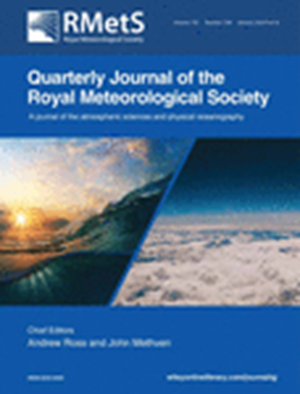基于赤道波信息的全球对流集合和混合统计动力方法极端降水概率预报的比较
IF 3
3区 地球科学
Q2 METEOROLOGY & ATMOSPHERIC SCIENCES
引用次数: 1
摘要
最近的工作表明,通过将开尔文、罗斯比和向西移动的罗斯比重力波的相位和振幅的模式预报与以这些波为条件的气候降雨统计相结合,可以对东南亚的强降雨事件进行熟练的混合统计-动力预报。本研究探讨了这种混合预测对其参数选择的敏感性,并将其预测菲律宾、马来西亚、印度尼西亚和越南极端降雨事件的能力与英国气象局全球和区域集合预测系统(MOGREPS)的预测能力进行了比较。在某些地区,混合预报在预测最极端事件时优于全局预报和对流预报集合,而在预测不太极端事件时,混合预报的效果更好。在大多数地区,MOGREPS预测和混合预测的加权混合预测在几乎所有极端事件定义中都具有最高的技能。为了量化预测波态误差对混合预测技能的影响,还使用再分析数据计算了假设最佳情况预测的技能,以指定波的振幅和相位。这种最佳情况预测表明,所有波浪类型的预测误差都会降低混合预测的技能,但开尔文波的技能降低幅度最大。在开尔文波占主导地位的地区,允许对流的模式比全球模式的技能更高,但有限区域高分辨率预报的附加值受到母全球模式中开尔文波表现不佳的阻碍。本文章由计算机程序翻译,如有差异,请以英文原文为准。
Comparison of probabilistic forecasts of extreme precipitation for a global and convection-permitting ensemble and hybrid statistical-dynamical method based on equatorial wave information
Recent work has demonstrated that skillful hybrid statistical-dynamical forecasts of heavy rainfall events in Southeast Asia can be made by combining model forecasts of the phases and amplitudes of Kelvin, Rossby and Westward Moving Rossby Gravity waves with climatological rainfall statistics conditioned on these waves. This study explores the sensitivity of this hybrid forecast to its parameter choices and compares its skill in forecasting extreme rainfall events in the Philippines, Malaysia, Indonesia and Vietnam to that of the Met Office Global and Regional Ensemble Prediction System (MOGREPS). The hybrid forecast is found to outperform both the global and convection-permitting ensemble in some regions when forecasting the most extreme events, however for less extreme events the ensemble is found more skillful. A weighted blend of the MOGREPS forecasts and the hybrid forecast was found to have the highest skill of all for almost all definitions of extreme event and in most regions. To quantify the influence of errors in the predicted wave state on the skill of the hybrid forecast, the skill of a hypothetical best case forecast was also calculated using reanalysis data to specify the wave amplitudes and phases. This best case forecast indicates that errors in the forecasts of all wave types reduce the skill of hybrid forecast, however the reduction in skill is largest for Kelvin waves. The skill in convection-permitting models is greater than for global models in the regions where Kelvin waves dominate, but the added-value of limited area high resolution forecasts is hampered by the poor representation of Kelvin waves in the parent global model.
求助全文
通过发布文献求助,成功后即可免费获取论文全文。
去求助
来源期刊
CiteScore
16.80
自引率
4.50%
发文量
163
审稿时长
3-8 weeks
期刊介绍:
The Quarterly Journal of the Royal Meteorological Society is a journal published by the Royal Meteorological Society. It aims to communicate and document new research in the atmospheric sciences and related fields. The journal is considered one of the leading publications in meteorology worldwide. It accepts articles, comprehensive review articles, and comments on published papers. It is published eight times a year, with additional special issues.
The Quarterly Journal has a wide readership of scientists in the atmospheric and related fields. It is indexed and abstracted in various databases, including Advanced Polymers Abstracts, Agricultural Engineering Abstracts, CAB Abstracts, CABDirect, COMPENDEX, CSA Civil Engineering Abstracts, Earthquake Engineering Abstracts, Engineered Materials Abstracts, Science Citation Index, SCOPUS, Web of Science, and more.

 求助内容:
求助内容: 应助结果提醒方式:
应助结果提醒方式:


